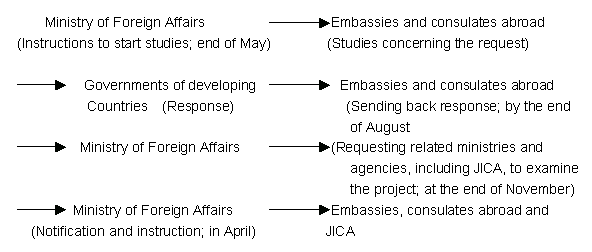|
JICOSH was closed in 2008. For further information, please contact JISHA.
|
 |
 |
|

Project-type Technical Cooperation in the Field of Safety and Health
(Announcement from Ministry of Health, Labour and Welfare)
1. What is Project-type Technical Cooperation?
"Project-type technical cooperation" is a type of technical support
that is systematically carried out as a project for several years (usually
five years) through organic linkage of the three basic steps : participant'
s training in Japan, recruitment of experts and preparaton of equipment
and materials.
2. Flow of Project-type Technical Cooperation
- Identifying the need for the project
- Requests from developing countries
-
Decision on carrying out the project
- Basic studies:
In order to determine the feasibility of the project, studies are carried
out concerning the background of the request, technical levels, legal systems,
and socio-economic conditions in the target country.
- Advance studies:
Studies are carried out concerning the project implementation system and
detailed project contents.
- Consultation for project implementation:
Consultations with the target country are carried out to determine conditions,
fields, term, and methods for cooperation. (Conclusion of an R&D agreement)
- Project implementation: Technologies are transferred to the target country
through the acceptance of participants for training in Japan, the recruitment
of experts and the provision of equipment and materials.
- Follow-up activities after project implementation
3.Requests for Project-type Technical Cooperation
(1) Request method
- Identifying the need for technical cooperation: The Ministry of Foreign
Affairs provides instructions to Japanese embassies in target countries
to carry out the uniform studies on cooperation requests. In response to
these instructions, Japanese embassies and JICA jointly initiate studies.
- The flow chart below outlines the procedures in processing requests:

(2) Important points in making requests
- Clearly identifying needs
It is necessary to clearly specify in details the need for carrying
out the relevant project for the target country. The objectives of the
project should also meet the country's national plans. For industrial
safety and health, the incidence of industrial accidents and other conditions
should be reflected in the project request. It is also desirable that
national plans include industrial safety health programs and similar projects
under which fields and programs for the relevant project are fully outlined.
- Well-focused technology transfer plans
Technology transfers should be planned in a well-focused manner by avoiding overly generalized or excessively broad programs. As safety and health is an extremely extensive field, technology transfers covering all sectors are not appropriate, and almost impossible to realize.
For example, specific fields should be identified in industrial safety or in safety and health education/training.
- High priority in policy ranking
In order to qualify for the selection from among a number of applications
for project-type technical cooperation, it is essential that the relevant
project be ranked very high in the country's political agenda. Accordingly,
safety and health issues should be highly positioned among the country's
policies. To this end, efforts by those who are responsible for safety
and health in the country are also required.
(3) Projects inappropriate for project-type technical cooperation
- Projects not included in the country's national plans
- Projects that require large amounts of funds for facilities, infrastructure
and equipment
- Projects without appropriate counterparts
- Projects that cannot use certain sites as locations at which the projects
can be carried out
- Projects covering a wide geographic area and requiring high local costs
- Projects relating to commercial production and joint ventures
(Reference) Japan's project-type technical cooperation activities completed
and /or ongoing in the field of safety and health See table 1.
|
|
